Items filtered by date: May 2023
Aging and Foot Problems
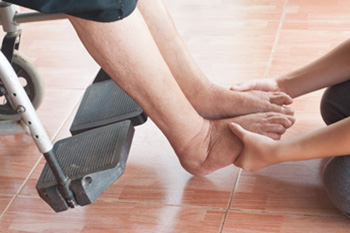
The feet are the base of our body. They carry our weight and get us from place to place. The older one is, the more wear and tear of life will show up on their feet. The feet change as people age, so it is common that foot padding is thinner and does not provide the cushioning of younger years. More pain may be felt in the foot and heel because of this. A senior may be prone to Morton's neuroma, which is a thickening of the nerve between the third and fourth toe on the bottom of the foot. It may feel like walking on a pebble, and it can be painful. Cracked heels is yet another common plague of aging. Mature skin has less oil and is drier. The skin on the feet may harden, crack, and hurt. In severe cases, fissures may develop, and care has to be taken to prevent potential infections. If you are older, it is suggested that you include a podiatrist on your health care team. This foot care expert can examine your feet regularly, teach you how to prevent foot problems from happening, and treat any that do occur.
If you need your feet checked, contact Stanley Luksenburg, DPM of Home Foot Care. Our doctor will attend to all of your foot and ankle needs and provide you with quality treatment.
Geriatrics and Podiatry
When people age, some common issues that may occur are bone density loss, dry skin, poor circulation, and rough brittle nails. These issues may also affect your foot health if the necessary steps are not taken to alleviate the problems.
It is important to take care of your feet because feet that are injured or diseased can affect your overall health. Having painful feet hinders your ability to do daily activities or may decrease your willingness to do the things that you need to do.
Visiting Your Geriatrician
As we age, health problems become more likely, so it is essential to visit your doctor for check-ups to ensure that you are doing the best you can to take care of your health. It is recommended to check your feet frequently for any possible cuts, bruises, swelling, corns or any other irregularities.
Taking Care of Elderly Feet
Cracked or dry feet can be treated by applying moisturizer often. It is also important not to wear old socks because the older the sock is, the higher the possibility there will be that there is bacteria there. Wear fresh socks and make sure they fit properly.
Proper foot health means that you can have a more active lifestyle and you will not be bogged down by pain. Foot health also leads to good circulation, which is paramount for overall health.
If you have any questions, please feel free to contact our office located in Fairway Park, OH . We offer the newest diagnostic tools and technology to treat your foot and ankle needs.
How Did I Get an Ingrown Toenail?
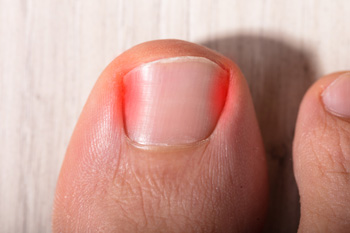
The big toe is often affected if an ingrown toenail develops. It is defined as the toenail growing into the skin instead of over it and can cause severe pain and discomfort. The medical term for an ingrown toenail is onychocryptosis, or unguis incarnates, and this condition may happen from wearing shoes that are too tight. It may also develop from genetic reasons or if the toenails are trimmed improperly. The noticeable symptoms can include tenderness surrounding the affected nail, and it may be red or ooze pus. An ingrown toenail can become a serious foot condition if an infection develops, and it is wise to seek prompt medical attention. Effective prevention methods include trimming the toenails straight across instead of in a curved fashion and wearing shoes that are made of breathable materials. The latter may also be helpful in preventing sweaty feet, which can lead to getting an ingrown toenail. If you have developed this painful condition, it is suggested that you seek the counsel of a podiatrist who can efficiently treat ingrown toenails.
Ingrown toenails can become painful if they are not treated properly. For more information about ingrown toenails, contact Stanley Luksenburg, DPM of Home Foot Care. Our doctor can provide the care you need to keep you pain-free and on your feet.
Ingrown Toenails
Ingrown toenails occur when a toenail grows sideways into the bed of the nail, causing pain, swelling, and possibly infection.
Causes
- Bacterial infections
- Improper nail cutting such as cutting it too short or not straight across
- Trauma to the toe, such as stubbing, which causes the nail to grow back irregularly
- Ill-fitting shoes that bunch the toes too close together
- Genetic predisposition
Prevention
Because ingrown toenails are not something found outside of shoe-wearing cultures, going barefoot as often as possible will decrease the likeliness of developing ingrown toenails. Wearing proper fitting shoes and using proper cutting techniques will also help decrease your risk of developing ingrown toenails.
Treatment
Ingrown toenails are a very treatable foot condition. In minor cases, soaking the affected area in salt or antibacterial soaps will not only help with the ingrown nail itself, but also help prevent any infections from occurring. In more severe cases, surgery is an option. In either case, speaking to your podiatrist about this condition will help you get a better understanding of specific treatment options that are right for you.
If you have any questions please feel free to contact our office located in Fairway Park, OH . We offer the newest diagnostic and treatment technologies for all your foot and ankle needs.
Warning Signs of Diabetic Neuropathy
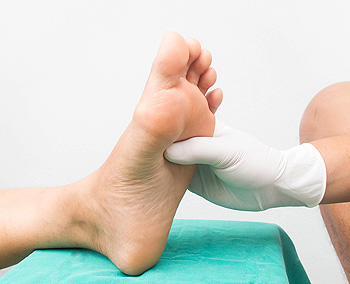
Diabetic neuropathy is one of the more serious side effects of maintaining high blood sugar levels for a long period of time. Neuropathy brought on by diabetes is the result of damage to the peripheral nerves, blocking the messages that control sensation to the feet. The effect is numbness, tingling, burning pain, and a reduced ability to detect changes in temperature. Weakness in the lower limbs and feet may result in pain, which can be treated with a number of medications. Infections from sores on the feet are commonly associated with peripheral diabetic neuropathy. In many cases, these sores, cuts, or other injuries to the feet become ulcerated because the patient is unable to detect them. Therefore, taking the time each day to inspect the feet, especially the soles, is imperative to ward off further damage. Increasing the level of exercise is thought to be helpful, and some patients receive pain relief from electro-stimulation treatments. If you have diabetes and are experiencing problems in the feet, it is suggested that you make an appointment with a podiatrist for an exam and treatment options.
Diabetic foot care is important in preventing foot ailments such as ulcers. If you are suffering from diabetes or have any other concerns about your feet, contact Stanley Luksenburg, DPM from Home Foot Care. Our doctor can provide the care you need to keep you pain-free and on your feet.
Diabetic Foot Care
Diabetes affects millions of people every year. The condition can damage blood vessels in many parts of the body, especially the feet. Because of this, taking care of your feet is essential if you have diabetes, and having a podiatrist help monitor your foot health is highly recommended.
The Importance of Caring for Your Feet
- Routinely inspect your feet for bruises or sores.
- Wear socks that fit your feet comfortably.
- Wear comfortable shoes that provide adequate support.
Patients with diabetes should have their doctor monitor their blood levels, as blood sugar levels play such a huge role in diabetic care. Monitoring these levels on a regular basis is highly advised.
It is always best to inform your healthcare professional of any concerns you may have regarding your feet, especially for diabetic patients. Early treatment and routine foot examinations are keys to maintaining proper health, especially because severe complications can arise if proper treatment is not applied.
If you have any questions please feel free to contact our office located in Fairway Park, OH . We offer the newest diagnostic and treatment technologies for all your foot and ankle needs.
Toenail Fungus Foot Soak
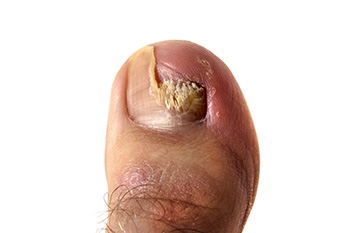
When an individual is living with a toenail fungus, they can experience any number of different annoying and unsightly symptoms. For example, a patient may have nails that are ragged and brittle in texture. A patient might also notice that their nails are slightly discolored. People who have toenail fungus can ask a trusted medical professional, like a podiatrist, how they can go about treating this condition. The answer can vary from patient to patient depending on the nature and severity of the condition. For example, a podiatrist might recommend that a patient perform a vinegar foot scrub in the future to prevent the development of the fungus. The reason for this recommendation is that vinegar has many antifungal and antibacterial properties that can prevent the onset of foot fungus. A vinegar foot soak also can soothe dry skin on the feet. If you currently have toenail fungus, it is suggested that you contact a podiatrist today for treatment.
For more information about treatment, contact Stanley Luksenburg, DPM of Home Foot Care. Our doctor can provide the care you need to keep you pain-free and on your feet.
Toenail Fungus Treatment
Toenail fungus is a condition that affects many people and can be especially hard to get rid of. Fortunately, there are several methods to go about treating and avoiding it.
Antifungals & Deterrence
Oral antifungal medicine has been shown to be effective in many cases. It is important to consult with a podiatrist to determine the proper regiment for you, or potentially explore other options.
Applying foot powder on the feet and shoes helps keep the feet free of moisture and sweat.
Sandals or open toed shoes – Wearing these will allow air movement and help keep feet dry. They also expose your feet to light, which fungus cannot tolerate. Socks with moisture wicking material also help as well.
If you have any questions please feel free to contact our office located in Fairway Park, OH . We offer the newest diagnostic tools and technology to treat your foot and ankle needs.
See Your Podiatrist Regularly If You Work On Your Feet
Extra Foot Care Needed for Older People
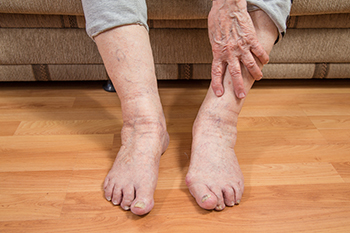
People more than 60 years old may notice their feet need extra care. The feet provide the ability to walk and run, and they have endured several thousand miles by the time this age occurs. Many people enjoy soaking their feet in warm water and may add essential oil drops for a more relaxed feeling. This can be followed by thoroughly drying the toes and applying a good moisturizer. Rough skin can be removed by using a pumice stone or an exfoliating foot scrub. One of the most important things older people can do for their feet is to wear shoes that fit correctly. The ideal shoe will have a low heel with ample room for the toes to move freely in. This may be helpful in preventing unwanted foot conditions, such as hammertoe, bunions, or corns. The feet can benefit from frequently performing regular stretching techniques, which can increase strength, flexibility, and circulation. If you would like additional information about effective foot care for elderly people, it is suggested that you consult with a podiatrist.
Proper foot care is something many older adults forget to consider. If you have any concerns about your feet and ankles, contact Stanley Luksenburg, DPM from Home Foot Care. Our doctor can provide the care you need to keep you pain-free and on your feet.
The Elderly and Their Feet
As we age we start to notice many changes in our body, but the elder population may not notice them right away. Medical conditions may prevent the elderly to take notice of their foot health right away. Poor vision is a lead contributor to not taking action for the elderly.
Common Conditions
- Neuropathy – can reduce feeling in the feet and can hide many life-threatening medical conditions.
- Reduced flexibility – prevents the ability of proper toenail trimming, and foot cleaning. If left untreated, it may lead to further medical issues.
- Foot sores – amongst the older population can be serious before they are discovered. Some of the problematic conditions they may face are:
- Gouging toenails affecting nearby toe
- Shoes that don’t fit properly
- Pressure sores
- Loss of circulation in legs & feet
- Edema & swelling of feet and ankles
Susceptible Infections
Diabetes and poor circulation can cause general loss of sensitivity over the years, turning a simple cut into a serious issue.
If you have any questions please feel free to contact our office located in Fairway Park, OH . We offer the newest diagnostic and treatment technologies for all your foot and ankle needs.
